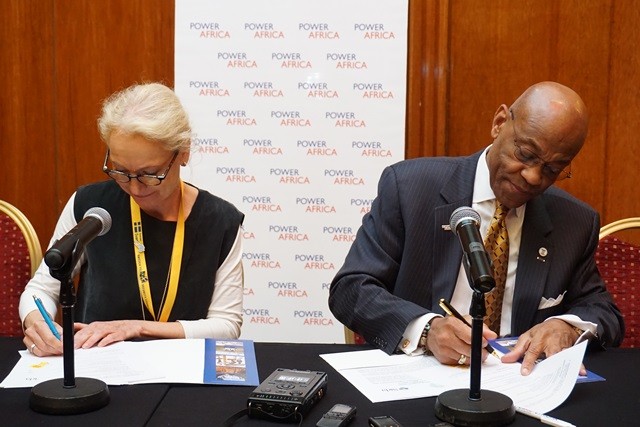
[As Prepared]
Thank you, Roberto. Good afternoon everyone, and welcome.
I would like to thank you all for joining today’s event. I especially want to thank our Swedish partners, represented by Minister Bolund, and our European Union partners, represented by Commissioner Mimica.
I would also like to thank my Power Africa colleagues, Dana Hyde who heads the Millenium Challenge Corporation and Elizabeth Littlefield who heads the Overseas Private Investment Corporation, as well as other representatives from the U.S. Government here today.
Yesterday, I had the honor of joining Commissioner Mimica and Secretary Lew as they signed our joint commitment to supporting Africa’s power sector, which included an impressive financial commitment of $2.8 billion in grants for sustainable energy activities over the next five years.
And, later today, Director-General Petri Gornitzka and I will sign a memorandum of understanding that solidifies Sweden’s commitment to catalyze more than $1 billion in investments to support Power Africa.
These commitments will make our partnerships with the European Union and Sweden even stronger. And, they will keep us on a path toward achieving Power Africa’s goals of adding 30,000 megawatts of additional power capacity and bringing electricity to 60 million households and businesses across sub-Saharan Africa.
Other partners are supporting our effort as well. For example, the World Bank has committed $5 billion, and the African Development Bank $3 billion, to support Power Africa’s goals.
To meet those ambitious goals, partnerships like these will be critical.
The private sector will be a critical as well. Since President Obama launched Power Africa two years ago, our private sector partners have led the way for this initiative.
Their support – and the leadership of African governments – has helped reach financial closure on over 4,100 megawatts of cleaner power capacity.
Today, these partners stand over 100 strong, and they have committed more than $20 billion for projects that will help change the energy landscape of the African continent.
That includes more than $1 billion to support off-grid and small-scale solutions over the next five years.
These kinds of investments are essential to expanding the capacity of African nations. In Tanzania, for example, 85 percent of people live off the national electricity grid.
Traditional electric projects aimed at reaching this group often face major challenges in service and distribution. And, they come at an upfront cost that is too high for the populations they serve.
These challenges are not unique to Tanzania. The fact is, we simply cannot meet our aggressive energy access targets through large grid extension projects alone. We also have to help ensure that people living in the most remote areas can get access to the power they need.
That is why Power Africa launched beyond the grid last year, an initiative to help companies scale up off-grid solutions.
Already, through beyond the grid, we have funded companies and projects expected to reach one million new connections.
One of our partners is off-grid electric, which relies on mobile payments and a local salesforce to provide affordable solar energy for more than 50,000 Tanzanian households. And, by 2017, they plan to reach one million homes.
There are many more examples like this, from Rwanda to Ghana. All over the continent, Power Africa partners are helping power homes and businesses, and reducing one of the greatest constraints to economic growth.
This success has been fueled by strong public-private partnerships and innovations in technology and financing.
To reach our goals, we need to expand this approach.
To do so, countries will have to build an environment that supports these partnerships, and enables innovation. For example, to ensure the success of mobile money services, that have worked so well in Kenya and Tanzania, it will be crucial to address regulatory barriers that hinder this type of payment system.
If we work together to address such barriers, and pursue new financing solutions that include development assistance, private sector investment, and domestic country resources, we can meet our bold energy goals.
And, eventually we can bring an end to extreme poverty around the globe.
Thank you for your kind attention, and for your partnership.
Sweden MOU Signing
As part of the U.S.-Africa Leaders’ Summit, President Obama hosted last year, the government of Sweden committed to catalyze investments of $1 billion for Power Africa.
Today, I am honored to join Director-General Petri Gornitzka to sign a memorandum of understanding between Power Africa and the Swedish International Development Cooperation agency, memorializing that commitment.
Together with commitments from the United States, Sweden’s commitment will unlock the additional private sector investment needed to help expand access to power across the African continent.
This is a significant step forward in transforming Africa’s energy sector, and ending extreme poverty.
Additionally, it will strengthen an already robust partnership between Sweden and the United States, to advance our shared development priorities.
It also continues USAID’s ongoing efforts to deepen our collaboration with key partners.
We look forward to working in partnership with Sweden to meet power Africa’s goals and successes.
Thank you.







Comment
Make a general inquiry or suggest an improvement.